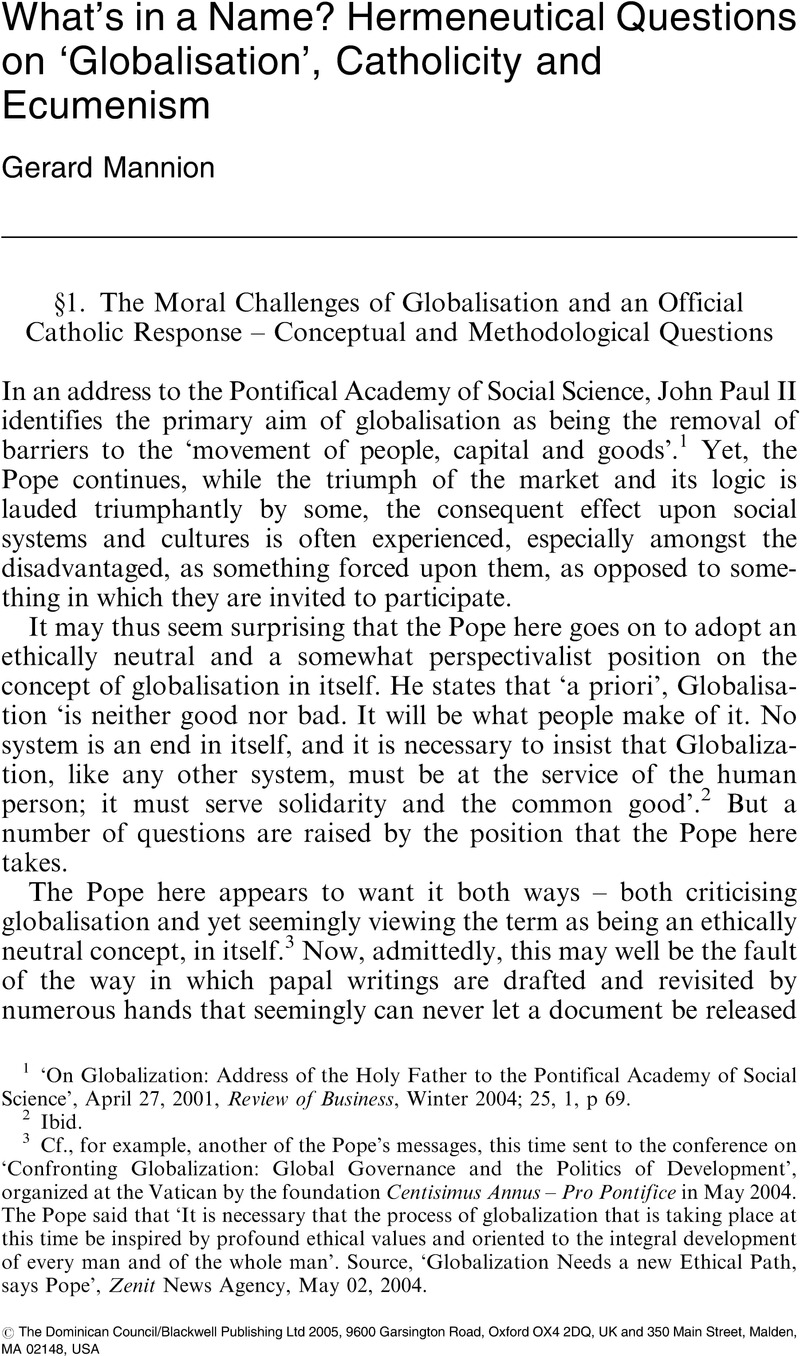No CrossRef data available.
Article contents
What's in a Name? Hermeneutical Questions on ‘Globalisation’, Catholicity and Ecumenism
Published online by Cambridge University Press: 01 January 2024
Abstract

- Type
- Catholic Theological Association 2004 Conference papers
- Information
- Copyright
- Copyright © The Dominican Council/Blackwell Publishing Ltd 2005
References
1 ‘On Globalization: Address of the Holy Father to the Pontifical Academy of Social Science’, April 27, 2001, Review of Business, Winter 2004; 25, 1, p 69Google Scholar.
2 Ibid.
3 Cf., for example, another of the Pope's messages, this time sent to the conference on ‘Confronting Globalization: Global Governance and the Politics of Development’, organized at the Vatican by the foundation Centisimus Annus – Pro Pontifice in May 2004. The Pope said that ‘It is necessary that the process of globalization that is taking place at this time be inspired by profound ethical values and oriented to the integral development of every man and of the whole man’. Source, ‘Globalization Needs a new Ethical Path, says Pope’, Zenit News Agency, May 02, 2004.
4 Of course, I am aware that the Pope has spoken and written extensively on the topic of globalisation and addressed some such difficulties in other contexts. Here I am merely raising these points and drawing upon this particular document for the purposes of elucidating the challenge facing the churches and possible ways forward in doing so.
5 ‘Globalization Needs a New Ethical Path, says Pope’, Zenit News Agency, May 02, 2004 (my italics).
6 I.e., a contradiction in the adjective – like a wooden iron.
7 Along with Charles Curran et al.
8 Aside from, of course, the personalist caveats throughout numerous writings of John Paul II.
9 Strenski, Ivan, ‘Religion in Globalization’, Journal of the American Academy of Religion, vol. 72, no. 3 (September 2004), 631–52CrossRefGoogle Scholar.
10 Ibid., 636. Strenski follows Wallenstein in dating the ‘rise of the modern world system…as falling between 1450 and 1670’, ibid., 637.
11 Strenski, ‘Religion in Globalization’, 645.
12 As Strenski also notes, ‘Outside Roman Catholic circles and, increasingly of late, the European Union, there is no consensus about an objective natural law, and even inside these circles the identity of such a natural law is contested’, Strenski, ‘Religion in Globalization’, 648.
13 Interestingly and, somewhat oddly, given that he states that he shares the scepticism concerning the inevitability and desirability of globalization early on in his paper, Strenski also claims, towards its end, that he has not taken a moral position on economic globalization, ibid., 648.
14 Schweiker, William, ‘A Preface to Ethics: Global Dynamics and the Integrity of Life’, Journal of Religious Ethics, vol. 32:1 (2004), 28CrossRefGoogle Scholar.
15 Cf. the analysis offered by Schweiker and Duraisingh (see below).
16 Mudge, Lewis, ‘Towards a Hermeneutic of the Household: “Ecclesiology and Ethics” after Harare’, The Ecumenical Review, 51 (July 1999), 252CrossRefGoogle Scholar. His thinking in this paper was developed in his later Rethinking the Beloved Community: Ecclesiology, Hermeneutics, Social Theory, Geneva, WCC Publications and University Press of America, 2001.Google Scholar
17 Schreiter, Robert J., The New Catholicity: Theology Between the Global and the Local, Maryknoll, Orbis, 1997, 16Google Scholar, cited in Mudge, ‘Towards a Hermeneutic of the Household’, 246.
18 Ibid.
19 Ibid., 246–7 (my italics).
20 Ibid., 247–8 (my italics).
21 Lewis Mudge, ‘Covenanting for a Renewing of Our Minds: A Way Together for the Abrahamic Faiths’, chapter eight of a forthcoming collection, Beyond Idealism: New ways Forward for Ecumenical Social Ethics, Eerdmans, Grand Rapids, Cambridge, 2005Google Scholar.
22 Lewis Mudge, Practicing Parallel Hermeneutics: Toward an Ethic for Cosmopolitans Among the Faithful of Judaism, Christianity and Islam, ‘Foreword’(forthcoming).
23 Ibid.
24 Mudge, ‘Covenanting for a Renewing of Our Minds’.
25 Ibid.
26 Schweiker, ‘A preface to Ethics’, 28 though I would add that globalisation, itself, functions, in many respects, as a grand operative and most powerful myth (although not, as with so many other forms of myth, as a truth‐bearing mechanism).
27 Ibid, 29.
28 Robert J. Schreiter, The New Catholicity. Cf., also, his Schreiter, Robert J., Constructing Local Theologies, Maryknoll, Orbis, 1985Google Scholar.
29 Mudge, ‘Towards a Hermeneutic of the Household’, 253.
30 Duraisingh, Christopher, ‘Contextual and Catholic: Conditions for Cross‐Cultural Hermeneutics’, Anglican Theological Review, vol. 82, no. 4 (Fall 2000), 685Google Scholar.
31 Ibid., 687.
32 Lakeland, Paul, The Liberation of the Laity, New York, Continuum, 2003, 240Google Scholar.
33 Komonchak, Joseph, ‘The Church universal as the Communion of Local Churches’, in Alberigo, Giuseppe and Gutiérrez, Gustavo, (eds.), Where Does the Church Stand?, New York, Seabury Press, 1981, 30Google Scholar. Cited in Duraisingh, 693.
34 Duraisingh, ‘Contextual and Catholic’, 693–4. Cf., also, Lumen Gentium on where the people of God are to be found, namely in all nations and at all times.
35 bid., 694.
36 Ibid., 696.
37 He goes on to affirm syncretism, following Leonardo Boff, (‘In Favour of Syncretism: The Catholicity of Catholicism’ in Church, Charism and Power, London, SCM, 1985)Google Scholar.
38 John Paul II, 38‘On Globalization: Address of the Holy Father to the Pontifical Academy of Social Science’, April 27, 2001, Review of Business, Winter 2004; 25, 1, p 69.
39 Ibid, 69.
40 He has in mind those, in particular, which ‘bear the stamp of utilitarianism’, ibid, 69.
41 Lakeland, Liberation of the Laity, 231.




